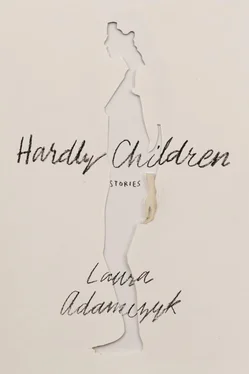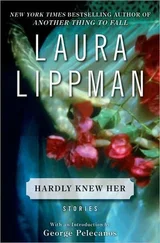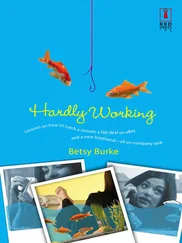Adam wears nothing but a pair of nylon shorts. They match his pale coloring, so that at first glance he appears naked, and then, on longer inspection, naked still, a eunuch. The shorts itch when he puts them on, but like the hooks, if he doesn’t move, he feels them less and less until he stops feeling them at all. He instead feels the air around him, how far he is from the gallery floor and the people standing below. At his younger sister’s studio apartment, the coffee table is inches from the couch he sleeps on. The arm of the couch is inches from her bed pillow. Some nights, he puts his head at the couch’s arm, some nights his feet. Other nights she asks that he not come home so she can have the apartment to herself.
The exhibit is, in some ways, about flight, about putting impossible objects in the air. In the first room, a glass of water hovers just inches off the floor. It’s hard to tell immediately that it’s not flush to the ground. A placard on the wall asks that viewers not touch any part of the installation, but they cannot help bending down and waving their hands around the glass. It looks so much like magic.
As the exhibit progresses, the objects get higher and higher. Two books, splayed open, float hip-high. A dark-wood bedside table comes to viewers’ necks. The contents of its open drawer are visible to most only when they balance on their toes: a handful of gray-wrappered condoms, pencils, and a steno tablet filled with scrawl. A tall brass lamp hovers some feet away and higher, lit and cocked at an angle. Viewers step around its shadow, the place where it would fall were it to fall. Then, walking through a narrow hallway, instinctively looking up one increment higher, they enter the other room. There a bed hovers upside down, pillows secured to its head, but blankets and sheets left to hang, as if to say that this is not solely about defying gravity. Then a scattering of clothes—a black bra, a balled white sock, a pair of cotton underwear. The loose parabola at once leads up to and trails away from Adam, as rock and fire and dust pulled behind a dying comet. It’s hot near the ceiling. Alex, the exhibit’s creator, told him to expect this, but each night it surprises him how surely the heat comes into his body. One moment the temperature is an antiseptic cool, the next his skin flushes, the feeling bleeding out from his chest like a stain. The problem is not the heat or being so far off the ground or the numbing pain that leaves him feeling both within and outside his body. It’s coming down, it’s being released. It’s the phantom cords tugging him backward as he walks to his sister’s home.
* * *
LAST WEEK HE FLEW HOMEto visit his father in Fort Wayne. The temperature had reached ninety before noon, and the house Adam grew up in, a gray foursquare on the south side of town, is still without air-conditioning. He had gotten comfortable on the porch swing with a book on the seventeen-year cicada and a glass of iced tea when his father came out and handed him a letter. He sat down across from Adam in an Adirondack chair, and as Adam was finishing reading, his father eased down beside him gingerly, as though trying not to wake a sleeping baby.
He isn’t his father, the letter told him. His mother not his mother and sister Sandy not his sister Sandy. The handwriting was neat and slanted forward, a tidy brick of text. But I love you very much and always will, it said.
His father was just inches away from him, hands stuffed in between his thighs, the two of them pushing the swing with their feet. Strange, Adam thought, the swing’s movement accompanying such a letter, as though everything should have stopped upon his reading it.
Why are you telling me this? he asked finally.
Your mother hadn’t wanted to tell you. When she got sick—even then she didn’t want to tell you. His father coughed.
It had been over two years since his mother died, and it was unsettling to think of his father defying some wish of hers, that there were secrets she thought she was taking with her. This, he realized, was more surprising than his father not being his father—a friendly, sometimes bumbling man who couldn’t offend or be offended by anyone. A man who conjured in Adam a guilty embarrassment, with his midwestern na ïvet é and optimism. Adam had always been more like his mother. Singular, sardonic, independent. Both he and Sandy. But his mother’s hair, her dark wiry hair and high cheekbones, were not his, and he sensed the blossoming magnolias in the yard twisting away from him, sliding along some invisible track, as though rigged pieces of a theater set being pulled offstage.
But Sandy’s not adopted, Adam said. How had his father put it? While Sandy was birthed of your mother .
No, it turns out, how shall I put this, our productivity problems weren’t such problems after all.
And you don’t know who these donors were?
No, they chose to stay anonymous. Healthy, though. Young. Unfortunately they don’t have all the information they do now—IQ, favorite color, all that. His father pushed his wire glasses up his nose.
Does Sandy know?
I was going to speak with her after I talked to you. Unless you’d like to have that conversation with your sister?
A year ago, the graphic design firm he’d been working for let Adam go. Six months after that, he shed three-quarters of his belongings and moved into his sister’s studio. When he’s not at the gallery, he makes them dinner. Pasta, big salads, omelets. Afterward they read or watch a movie on his laptop, the two of them smashed together on the couch like children who never left their parents’ home.
A little help here, son? his father said. Adam had stopped pushing and the swing was moving unevenly. He righted it with his foot, wanting to yell at his father. He knew how easy it would be to make him feel bad, that he wouldn’t defend himself. Instead, he would bumble. He would say, Well, I-I’m sorry —the soft skin of his jowls shaking—and there would be nothing satisfying in it.
They spent the rest of the day on the porch, talking slowly about nothing. Adam’s father would go inside to refill their iced tea and Adam would note the difference on the swing with the weight of his father gone. He would reemerge from the house carrying a plate of apples and cheese or boiled hot dogs with a palette of condiments. Once, sitting beside him again, his father pointed to a cluster of hostas in the yard, bursting with growth, and said, Adam, look. Last week, they were only this big.
* * *
ADAM WATCHES SANDYget ready for work. He’s on the couch in a pair of shorts; she’s standing outside the bathroom, tucking a silk blouse into a gray pencil skirt. Face hard and staring at nothing. No one would guess they aren’t related. If not siblings, then at least cousins. His hair is similarly dark, skin similarly pale, a resemblance that has only increased with age, as though they were growing into each other, as friends or lovers dress or talk alike over time.
Sandy disappears into the bathroom then reemerges, shaking her wet hair. Her movements—bending to pick up a sock or square a stack of books—have been so uncannily Sandy it feels like watching an actress who has studied her for years, combed her hair just so, and taken her place. The woman is talented, so assured in her role that even her slips into melodrama feel like Sandy, if not more Sandy. Fast-walking, focused Sandy. It all appears unsettlingly right, as when a liar moves so deeply into his lie that he convinces himself it’s true.
Has Dad talked to you lately? Adam asks.
No, why? She’s pouring milk over a bowl of cereal at the kitchen counter.
Not since I’ve been back?
Читать дальше











